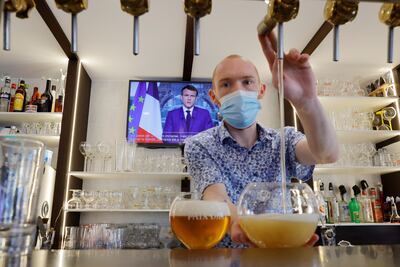Alcohol consumption was responsible for more than 740,000 cancer cases worldwide last year, an international study says.
The stark findings in the global population study backed by the World Health Organisation, prompted doctors to renew the call for greater awareness about the dangers of alcohol abuse.
The research, published in The Lancet, attributed 741,300 of all new cancer cases in 2020 to alcohol use.
Figures for the UAE were low, with just 39 cases directly linked to alcohol in 2020, but alcohol-related cancers were on the rise elsewhere in India, China, Vietnam and sub-Saharan Africa.
VPS Healthcare surgeon
The study’s authors said the figures were likely to be conservative, because many cancer cases were likely to go undiagnosed during the pandemic, while binge drinking during travel restrictions increased.
Alcohol warning signs are not only for men
“This is a trend that has happened over a number of decades and not just recently,” said liver surgeon Dr Rehan Saif, a transplant consultant at VPS Healthcare in Abu Dhabi.
“The WHO delivered a warning on the carcinogenic risks associated with alcohol a number of years ago.
“We have known that alcohol is related to liver disease and oral cancers, and men traditionally consume more alcohol than women.
“But In countries where there is a socio-economic boom, like India and China, we are seeing more women consuming high levels of alcohol.
“While the distribution may not yet be equal, it is certainly higher than is being reported.”
In China, 282,300 new cancer cases were linked to alcohol, while India had 62,100.
Researchers evaluated risk by looking at consumption levels and relating them to cancer diagnoses.
Prevalence was split into three categories – moderate drinking, up to two drinks a day; risky drinking, between two and six alcoholic beverages a day; and heavy drinking, more than six drinks consumed daily.
Moderate drinkers also at risk
Heavy drinkers made up the largest number of cancer cases, 346,400, but even those drinking moderately were at risk.
Light to moderate drinkers who consumed just two drinks a day represented one in seven of all new cancers in 2020, more than 100,000 cases worldwide.
“When alcohol is paired with other carcinogenic agents, such as smoking and poor diet, there is a risk of multiple cancers,” Dr Saif said.

“The one way forward is to increase pubic awareness, because a lot of people do not know what the safe limit is.
“Alcohol warnings similar to what we now see on cigarette packaging would be a good way to increase that.
“Everything is safe in moderation, but we know binge drinking is more harmful.
“The driving force for change will be more understanding of the ill effects.”
Recommended safe drinking levels are no more than 14 units a week, spread across three or more days.
On average, that is the equivalent to about nine glasses of wine or seven pints of lager.
For the study, a percentage of each population at risk was calculated, considering age, sex, country and cancer type.
The population attributable fraction (PAF) combined the prevalence of exposure and relative risk.
The UAE was given a PAF figure of 1.4 per cent in men, the region’s highest, compared with 0.7 per cent In Lebanon, 0.3 per cent in Iraq and Qatar and 0.1 per cent in Saudi Arabia.
Doctors said that figure was probably because of the high proportion of expatriates living in the Emirates.
In the UK and Australia, the PAF was 4.9 per cent and in the US the number was 3.8 per cent in men.
Pandemic has exacerbated problem

“During the pandemic more people increased their alcohol consumption,” said Dr Sadir Alrawi, director of oncology at VPS Healthcare’s hospitals in Dubai, Sharjah and Abu Dhabi.
“However, the number of alcohol-related cancer cases in the UAE are still relatively low.
“Expatriates, rather than locals, drink alcohol here, so these numbers [in the UAE] are more applicable to standards elsewhere in the world.
“When combined with smoking, alcohol becomes more dangerous and this should be addressed.”
European regions showed a decrease in drinking trends compared with 2012 data, but significant increases in alcohol consumption were found in several other regions, including Africa and Asia.
The most common cancers associated with alcohol were of the mouth, throat, colon liver and rectum, with breast cancer most common in women.
The UK had an estimated 4 per cent, or 16,800, of cancer cases linked to alcohol, including 4,400 cases of breast cancer.
In the UAE, just 0.8 per cent of all cancer cases were attributed to alcohol, while in the US, 3 per cent of cases (52,700) were alcohol related.
Research showed men were more than three times more likely to develop alcohol-related cancer than women.
Figures revealed 77 per cent (568,700) of alcohol-induced cancers were diagnosed in men compared with just 23 per cent (172,600) in women.
“Although there are multiple other factors such as smoking and obesity, alcohol is the commonest predisposing factor linked to oesophageal and liver cancers,” said Dr Nikunj Gupta, a gastrointestinal surgeon at NMC Royal Hospital, Dubai.
“Most of the patients that present with these cancers have a strong history of alcohol consumption, especially in males.
“This study shows the need to educate people which will go a long way in reducing the healthcare burden.”


